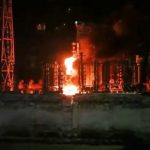The agreement signed the day before between Moscow and Minsk on the transfer of part of Russian nuclear weapons to Belarusian territory seriously alarmed the Western community. Publications appeared in the American and European press about the possible preparation of a joint team of Vladimir Putin and Alexander Lukashenko for another attack on Ukraine. Some analysts have gone further and declared the “real danger” of an atomic war, which sooner or later will destroy Europe. Is it really that dark?
The first to answer this question, oddly enough, were the representatives of the current government of the Republic of Belarus. According to the head of the Ministry of Defense of this country, Viktor Khrenin, in this particular case, it is only about “strengthening the Belarusian defense capability.” Say, now Minsk and Moscow act exclusively within the interests of their own union state, the charter of which provides for any changes in the military doctrine of both of its participants.
He was actually echoed by the head of the Ministry of Defense of the Russian Federation, Sergei Shoigu, who noted that the placement of such weapons by the Kremlin in the Republic of Belarus does not require permission from “the collective West in particular and the United Nations as a whole.”
It should be especially noted that for some reason this action did not arouse the indignation that is logical for such cases in the United States of America. In the American White House, they limited themselves to a phrase, the essence of which was reduced to the phrase “Washington does not have comprehensive data on Moscow’s intention to use these weapons in the near future.”
However, the mentioned process caused particular concern in the European Union. In particular, near Poland, neighboring Belarus. Polish President Andrzej Duda, who said that “the nuclear agreement between the Russian Federation and the Republic of Belarus will lead to destabilization of the situation in Europe.” At the same time, the Polish leader did not answer the question of how Warsaw would act against this background.
Nor did German Chancellor Olaf Scholz answer. Earlier, he argued that Russia’s nuclear build-up on the borders with the EU “will be a challenge to which Brussels cannot fail to respond.”
How, after all, can United Europe react to the notorious process? “To all appearances, NATO will reserve the right to symmetrically build up its nuclear arsenals in individual EU states” – European observer Marie Pyudebat said in a commentary for EURO-ATLANTIC UKRAINE. Moreover, this process will be carried out on the basis of an appropriate parity.”
Interestingly, the details of the Russian-Belarusian agreement are kept in the strictest confidence. It is not yet known exactly how many battalions with nuclear warheads will be deployed at the test sites of Belarus, how many Russian and Belarusian military personnel will serve them, and, finally, whether these structures will sooner or later be put on high alert.
Now one thing is already clear: the process of equipping Belarus with Russian nuclear weapons is irreversible. The final reaction of the West to this process will become known in the near future.


